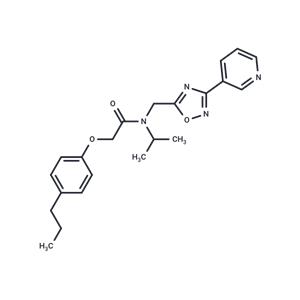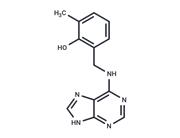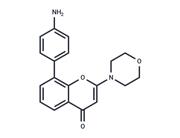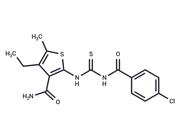| Name | PI-1840 |
| Description | PI-1840(IC50 = 27 nM)is a reversible and selective chymotrypsin-like (CT-L) inhibitor, with little proteasome proteolytic effects on trypsin-like (T-L) and postglutamyl-peptide-hydrolysis-like (PGPH-L). |
| Cell Research | Cells are plated in 96-well plates in 100 μL medium and allowed to attach overnight. Cells are then incubated for 120 h with varying concentrations of inhibitors. Media is aspirated and replaced with 100 μL complete media containing 1 mg/ml MTT and incubated for three hours at 37 °C in 5% CO2 humidified incubator. Media is then aspirated and DMSO is added. Cells are incubated for 10 min at room temperature while shaking, and the absorbance is determined at 540 nm using a μQuant spectrophotometric plate reader. The IC50 values are determined using equation under CT-L, T-L, PGPH-L proteolytic activity assays.(Only for Reference) |
| Kinase Assay | CT-L, T-L, PGPH-L proteolytic activity assays: In the high-throughput screen, fluorogenic peptides are used as substrates to assay (at 10 μM) the 50,000 compounds library from ChemBridge for inhibitory activity against the CT-L proteolytic activity of the purified rabbit 20S proteasome. To test for selectivity for CT-L over T-L and PGPH-L the corresponding fluorogenic peptides are used. Briefly, 1 nM of purified 20S rabbit proteasome is incubated with 20 μM Suc-Leu-Leu-Val-Tyr-AMC for the CT-L activity, Bz-Val-Gly-Arg-AMC for the T-L activity, and benzyloxycarbonyl Z-Leu-Leu-Glu-AMC for the PGPH-L activity for 1 h at 37 °C in 100 μL of assay buffer (50 mM Tris-HCl, pH 7.6) with or without compound. After incubation, production of hydrolyzed 7-amido-4-methyl-coumarin (AMC) groups is measured using a WALLAC Victor2 1420 Multilabel Counter with an excitation filter of 355 nm and an emission filter of 460 nm. The amount of AMC released is within the linear range. Bortezomib is used as a positive control for IC50 determinations. To determine proteasome activity in whole cell, extracts (5 μg) from cultured cell lysate is used instead of 20S rabbit proteasome, and followed the same assay mentioned above. |
| In vitro | PI-1840 potently inhibits proteasomal CT-L activity with IC50 of 0.37 μM in intact human MDA-MB-468 cancer cells, and inhibits proliferation/survival of human MDA-MB-468 cells. [1] In intact cancer cells, PI-1840 inhibits CT-L activity, induces the accumulation of proteasome substrates p27, Bax, and IκB-α, inhibits survival pathways and viability, and induces apoptosis. [2] |
| In vivo | PI-1840 (150 mg/kg i.p.) inhibits the tumor growth in mice of MDA-MB-231 breast tumors. [2] |
| Storage | Powder: -20°C for 3 years | In solvent: -80°C for 1 year | Shipping with blue ice. |
| Solubility Information | Ethanol : 31 mg/mL (78.6 mM)
H2O : < 1 mg/mL (insoluble or slightly soluble)
DMSO : 72 mg/mL (182.5 mM)
|
| Keywords | cell proliferation | Proteasome | Caspase | proteasome substrates | poly ADP ribose polymerase | inhibit | NF-κB | Autophagy | cell cycle | PI1840 | anticancer | Apoptosis | Bcl-2 Family | MG-63 cells | Nuclear factor-kappaB | PI-1840 | Inhibitor | U2-OS cells | PARP | Nuclear factor-κB |
| Inhibitors Related | Sitagliptin | Teneligliptin hydrobromide | Sitagliptin phosphate monohydrate | 3-Aminobenzamide | XAV-939 | Niraparib | Linagliptin | Vildagliptin | Olaparib | Benzamide | Alloxan monohydrate | 4'-Hydroxychalcone |
| Related Compound Libraries | Highly Selective Inhibitor Library | Apoptosis Compound Library | Target-Focused Phenotypic Screening Library | Bioactive Compound Library | HIF-1 Signaling Pathway Compound Library | Epigenetics Compound Library | Protease Inhibitor Library | Inhibitor Library | Anti-Aging Compound Library | Bioactive Compounds Library Max |

 United States
United States



